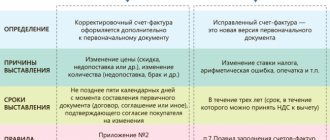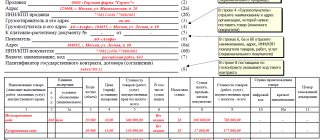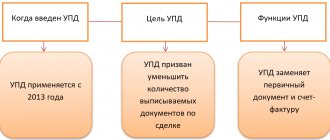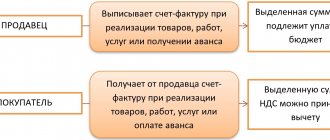Answer:
In accordance with the Rules for issuing invoices in electronic form, approved by order of the Minister of Finance of the Republic of Kazakhstan dated April 22, 2021 No. 370, when selling goods included in the List to individuals with the presentation of a KKM receipt, the supplier of such goods issues an ESF for the entire turnover per day
, for each type of product, with filling out separate lines in Section C “Recipient Details”:
- in line 17 Recipient
– indicate the value
Individuals
(this line is filled in automatically); - in line 18 Address of location
– indicate the value
Retail trade
; - in cell “I” of line 20 Recipient category
of section
C. Recipient details
– check mark.
Regarding the mark in the Recipient Category line:
The flag in cell “I” is set if the recipient is an individual to whom the goods were sold with the obligatory presentation of a cash register receipt.
Further in section E. Agreement (contract)
You must fill in the following information:
The line Method of dispatch indicates the method of dispatch in accordance with the agreement (contract) for the supply of goods, works, and services.
The dispatch method is indicated by a digital code in accordance with the decision approved by the Customs Union Commission of September 20, 2010 No. 378 (Appendix No. 3). In the case of selling goods at retail (to an individual), the user must indicate the code – 99 “Other”.
Healthy
- How to set up automatic filling of ESF for individuals (buyer category “J”) in 1C?
- Deadline for issuing an electronic invoice (sales to individuals for cash) when applying within the limitation period.
- What category of buyer should be indicated in the electronic invoice if the individual is a non-resident?
In the line Terms of delivery
a three-digit alphabetic code is indicated in capital letters, in Latin font in accordance with the decision approved by the Customs Union Commission of September 20, 2010 No. 378 (Appendix 13).
For international transactions in accordance with customs, including customs of business (Incoterms), XXX “Other name of delivery terms”
.
Video tutorial: How to write out ESF for retail?
(excerpt from the webinar “Electronic invoices. Types of ESF and features of filling out”)
Do I need to prepare invoices when selling goods remotely to individuals?
So, according to paragraph 1 of Art. 168 of the Tax Code of the Russian Federation (hereinafter referred to as the Tax Code of the Russian Federation), when selling goods (work, services), transferring property rights, the taxpayer, in addition to the price (tariff) of the goods (work, services) sold, is obliged to present for payment to the buyer of these goods (work, services), property rights to the corresponding amount of tax.
However, when selling goods (performing work, providing services) for cash directly to the population, the requirements for preparing payment documents and issuing invoices are considered fulfilled if the seller issues the buyer a cash receipt or other document of the established form (clause 7 of Art. 168 of the Tax Code of the Russian Federation). This rule was also voiced in the Letter of the Ministry of Finance of Russia dated July 31, 2009 No. 03-07-09/38.
Thus, when selling goods to an individual, the taxpayer is exempt from the obligation to issue an invoice, but subject to two conditions:
- the buyer (individual) pays in cash;
- the seller (organization) issues a cash receipt or other document of the established form.
Thus, if an individual pays for a purchase by non-cash method, the taxpayer supplier is not relieved of the obligation to issue an invoice within five calendar days from the date of shipment of goods (performance of work, provision of services) or from the date of receipt of payment amounts, partial payment for upcoming supply of goods (performance of work, provision of services) in accordance with clause 3 of Art. 168 Tax Code of the Russian Federation.
Despite the fact that in fact the invoice is of no interest to the buyer - an individual who is not a VAT payer, the seller is still obliged to issue an invoice to the individual and register it in the invoice journal and in the sales book ( in case of non-cash payment).
Additional information can be found in SPS ConsultantPlus:
- In the Quick Search line, type invoicing to an individual.
- On the right, click on the “Find” button, we receive a list of documents and consultations on the topic of interest to us.
- To sort the list of documents by Information Banks, click on the “ Build a complete list ” link in the upper right corner.
It is important to note that if the responsible person had valid reasons for not providing information to the bailiff and, despite this circumstance, the bailiff imposed a fine, then the decision can be challenged in court
S.A. Pochkina LLC "IC U-Soft" Regional information center of the ConsultantPlus Network
It is not necessary to issue invoices for payment from an LLC to an individual, especially if we are talking about paying for services or goods in cash. If payment is made by bank transfer, the accountant can issue such an invoice, even if the private owner is not an individual entrepreneur. This procedure is standard, although it has some features.
Invoice for an individual
An invoice is not always issued to an individual when selling goods (performing work, providing services). In our article, we will consider when it is necessary to issue this document for an individual, and when it is not necessary to do so.
This photo was purchased from Shutterstock.
What is the main purpose of an invoice?
An invoice is a tax accounting document for VAT. It is issued for relevant transactions (sales of goods, works, services, etc.) by persons under the general taxation regime, and in some cases, for example, when importing goods from abroad, and by persons using special tax regimes. The document indicates the amount of tax that must be accrued for payment to the budget from the transaction performed.
The person who received the document, if he is a payer of the specified tax, can reduce the amount of VAT payable to the budget by the reflected amount of tax, because Art. 169 of the Tax Code of the Russian Federation defines an invoice as a document on the basis of which the buyer claims a VAT deduction. This is the main purpose of an invoice.
Buyers - individuals may or may not be VAT payers. It all depends on the availability of entrepreneurial status and the applicable tax regime. We will discuss in the next section when an invoice must be issued to an individual.
What are the features of issuing an invoice to an individual if he is an individual entrepreneur on OSNO?
If the buyer is an individual - an individual entrepreneur who is in the general regime, then he will need an invoice to submit tax for deduction.
In order for an individual entrepreneur to receive a deduction, the seller must follow some rules:
The invoice must contain all the necessary details: number and date, names of the seller and buyer, TIN of both parties and addresses, name of the product (work, service), its quantity, price and value, tax rate and amount, etc.
NOTE! When filling out the line with the name of the buyer, it is advisable to indicate his entrepreneurial status, i.e.
It is better to write in the invoice: “Buyer: individual entrepreneur (or individual entrepreneur) Ivan Vasilievich Petrov.” However, it is possible to obtain a deduction without such an indication.
- The invoice can only be signed by authorized persons.
- The document must be issued no earlier than the date of shipment of the goods within 5 working days from such shipment.
There are other invoice requirements.
We talk about them in a special section .
If any errors or omissions are discovered, it is best for the entrepreneur to contact the seller with a request to replace the damaged document with a new one. Otherwise, problems will arise with the deduction.
What to do with issuing an invoice if the buyer is an individual entrepreneur on a special regime?
Entrepreneurs using special tax regimes, in general cases, should not charge and transfer VAT to the budget (with the exception of importing goods, performing the duties of a tax agent for a specified tax and issuing invoices by themselves when selling goods, works, services).
When completing a transaction, the seller and the buyer, an individual entrepreneur in a special mode, can agree on the condition of not issuing invoices (subclause 1, clause 3, article 169 of the Tax Code of the Russian Federation). You can also refuse them if the individual entrepreneur is on the general regime, but is exempt from paying VAT (for example, under Article 145 of the Tax Code of the Russian Federation). But if the agreement of both parties to the transaction to refuse invoices cannot be achieved, the seller will have to draw up all documents in the general manner.
IMPORTANT! The special regime person will not be able to exercise the right to deduct VAT on the basis of received invoices, even if he is obliged to pay tax to the budget (upon import or when he issues an invoice with the allocated tax amount). After all, the Tax Code grants this right only to VAT taxpayers (Article
172 of the Tax Code of the Russian Federation).
Is it necessary to issue an invoice for individuals without entrepreneurial status?
Individuals without entrepreneurial status are not VAT payers in any case. Therefore, the seller has the right not to issue invoices for them. How the buyer pays for the goods - whether he transfers money to the cash register or transfers it to a bank account - also does not affect the need for paperwork.
This is where sellers may have a question: how will the accrued tax data get into the sales book? The Ministry of Finance offers the following solutions:
What is the main purpose of an invoice?
An invoice is a tax accounting document for VAT. It is issued for relevant transactions (sales of goods, works, services, etc.) by persons under the general taxation regime, and in some cases, for example, when importing goods from abroad, and by persons using special tax regimes. The document indicates the amount of tax that must be accrued for payment to the budget from the transaction performed.
The person who received the document, if he is a payer of the specified tax, can reduce the amount of VAT payable to the budget by the reflected amount of tax, because Art. 169 of the Tax Code of the Russian Federation defines an invoice as a document on the basis of which the buyer claims a VAT deduction. This is the main purpose of an invoice.
Buyers - individuals may or may not be VAT payers. It all depends on the availability of entrepreneurial status and the applicable tax regime. We will discuss in the next section when an invoice must be issued to an individual.
Invoice for an individual
CM. Matveeva, UNP expert
Document for yourself
Any company that sells goods, work or services is required to issue invoices (of course, except for those organizations that use special regimes). This is stated in paragraph 3 of Article 168 of the Tax Code of the Russian Federation. The only exception to this rule is made for companies selling goods to the public for cash. Only they have the right not to issue invoices to customers, limiting themselves only to cash receipts or, if we are talking about services, strict reporting forms (clause 7 of Article 168 of the Tax Code of the Russian Federation).
It turns out that the selling company is obliged to issue an invoice to a client who pays for goods not in cash, but through a bank branch. Otherwise, tax authorities may fine the organization under Article 120 of the Tax Code of the Russian Federation for a gross violation of the rules for accounting for income, expenses and objects of taxation (the minimum fine under this article is 5,000 rubles).
On the other hand, by issuing an invoice with a designated VAT amount, the taxpayer violates paragraph 6 of Article 168 of the Tax Code of the Russian Federation, which does not allow the tax amount to be separately indicated in documents issued to the population. It turns out that the seller must issue invoices to individuals without allocating VAT to them.
But even if the taxpayer violates this requirement, the tax authorities will not be able to punish him: the Tax Code does not establish liability for such a violation.
Everyone has their own shortcomings
It is not as easy to issue an invoice for an individual as for an organization. All details of a legal entity necessary to fill out this document are usually specified in the contract. But a private person, when placing an order, provides a minimum of information about himself - last name, first name and delivery address, and occasionally a telephone number. But a correctly executed invoice, in addition to these data, must contain one more mandatory detail - the buyer’s TIN. But it is precisely this information that is often missing.
The main thing is that the company regularly displays them when selling goods, correctly calculates and pays VAT to the budget, and keeps books of purchases and sales. The Department of Indirect Taxes of the Federal Tax Service of Russia agrees with this. “Of course, formally the company violates the rules for issuing invoices by not indicating the buyer’s TIN,” the specialists of this department answered us. — But in this situation, goods are purchased by individuals who, to put it mildly, do not need input VAT.
What if the company receives an advance payment from an individual, draws up an advance invoice and then, at the time the goods are sold, reflects it in the purchase book? Will the tax authorities accept this deduction if they notice that the invoice is missing one of the required details? The Department of Indirect Taxes of the Federal Tax Service of Russia assured us that nothing threatens the taxpayer here either. After all, the peculiarity of an advance invoice is that the seller does not present it to the buyer, but keeps it for himself, first charging VAT and then deducting it. And tax authorities are unlikely to refuse an organization a deduction for such an invoice.
What to do with issuing an invoice if the buyer is an individual entrepreneur on a special regime?
Entrepreneurs using special tax regimes, in general cases, should not charge and transfer VAT to the budget (with the exception of importing goods, performing the duties of a tax agent for a specified tax and issuing invoices by themselves when selling goods, works, services).
When completing a transaction, the seller and the buyer, an individual entrepreneur in a special mode, can agree on the condition of not issuing invoices (subclause 1, clause 3, article 169 of the Tax Code of the Russian Federation). You can also refuse them if the individual entrepreneur is on the general regime, but is exempt from paying VAT (for example, under Article 145 of the Tax Code of the Russian Federation). But if the agreement of both parties to the transaction to refuse invoices cannot be achieved, the seller will have to draw up all documents in the general manner.
IMPORTANT! The special regime person will not be able to exercise the right to deduct VAT on the basis of received invoices, even if he is obliged to pay tax to the budget (upon import or when he issues an invoice with the allocated tax amount). After all, the Tax Code grants this right only to VAT taxpayers (Article 172 of the Tax Code of the Russian Federation).
How to issue an invoice: sample
- outgoing and incoming own number;
- name, contact details of the seller;
- information and contact details of the buyer or customer;
- discharge date;
- company and tax information;
- date of dispatch/delivery/purchase/services rendered;
- order number or other number by which the customer can track the progress of delivery;
- total amount;
- payment terms;
- and other information, for example, special conditions, information about taxes, penalties for late delivery, late payment or refunds in case of damage to the order.
Today there is no form that approves the type of account or prescribes its standard. It is not even considered an accounting document. An invoice is issued and issued for payment electronically or in paper form. Be sure to indicate the following:
How to issue an invoice to a private person
If you provide a service to an individual with payment on account, you will first have to enter into an agreement with the individual. When paying funds to the account of a limited liability company, the buyer of a service or product will have to indicate the number of this agreement in the payment receipt. The accountant of the enterprise, meanwhile, will have to issue a single copy of the invoice, in which the following data should be indicated:
- serial number of the document and the date of its issue;
- FULL NAME. client, his TIN and address;
- the name of the LLC, its tax number and legal address;
- names of goods or name of services provided indicating units of measurement (pieces, hours, etc.);
- the volume of services supplied, work performed or goods supplied, taking into account the accepted units of measurement;
- if you provide a service at government rates, including tax, you will have to indicate the price of a unit of goods or the tariff for the service provided without tax;
- total cost of goods/services without tax;
- the tax rate and the total amount of tax are also indicated;
- total cost including tax;
- Finally, the country of origin of the goods is indicated.
invoices for payment
Since an individual cannot be a VAT payer, it is not necessary to fill out an invoice in two copies.
If you encounter difficulties when filling out an invoice due to the lack of detailed information about the buyer or service user, you can put dashes in some columns. After filling out the document, you must, based on the results of the tax period, register the account properly (in the enterprise accounting journal), and also do not forget to make a corresponding entry in the sales book.
Results
With the help of invoices, buyers of goods (works, services, etc.) can exercise their right to reduce VAT payable to the budget. But not everyone has this right, but only VAT payers, for example, general-regime individual entrepreneurs. They need an invoice to confirm the deductions.
Individuals who have entrepreneurial status, but use special tax regimes, cannot claim a VAT deduction, so an invoice may or may not be issued to them as agreed by the parties to the transaction.
An individual without entrepreneurial status will definitely not need invoices, so the seller can refuse to issue them, thereby significantly saving his resources.
We advise you to read the Procedure and deadlines for paying VAT in 2021
Issue an invoice for payment - what you need to do to issue an invoice
This question interests many, but its formulation is not entirely correct. Just a bill - yes, but for an individual this makes no sense, and the organization will not pay it: for it it means violating tax laws. Settlements with individuals for work performed are carried out under employment or civil law contracts; the purchase of any goods from an individual is formalized by a sales contract.
In trade relations with foreign partners, quite often you have to deal with this document in English. Russian legislation allows invoices to be generated in English or, upon receipt, to be used in document flow without translation. In this case, as a rule, we mean a document that in the language of Foggy Albion is called “invoice”.
Invoice for an individual: possible without TIN
It turns out that the selling company is obliged to issue an invoice to a client who pays for goods not in cash, but through a bank branch. Otherwise, tax authorities may fine the organization under Article 120 of the Tax Code of the Russian Federation for a gross violation of the rules for accounting for income, expenses and objects of taxation (the minimum fine under this article is 5,000 rubles). On the other hand, by issuing an invoice with a designated VAT amount, the taxpayer violates paragraph 6 of Article 168 of the Tax Code of the Russian Federation, which does not allow the tax amount to be separately indicated in documents issued to the population. It turns out that the seller must issue invoices to individuals without allocating VAT to them. But even if the taxpayer violates this requirement, the tax authorities will not be able to punish him: the Tax Code does not establish liability for such a violation.
Tags: accountant, job description of the general director, tax, order, problems, expense
What is an "invoice" and what is an "account"
A detailed answer to the question of what an invoice is is given in Article 169 of the Tax Code.
It defines it as a document that serves as the basis for the buyer to accept the goods (work, services), property rights presented by the seller (including the commission agent, agent who sells the goods (work, services), property rights on his own behalf, the amount of tax for deduction. Concept " invoice" is often used to define a payment document presented by the seller to the buyer. There is no officially defined definition of "invoice" in regulatory documents. It is issued both for products already shipped (work performed, services rendered) and for advance payment (prepayment). Invoice for payment is not a document on the basis of which a VAT deduction is issued.
An invoice is a form of document determined by the organization. The invoice form was approved by Government Decree No. 1137 of December 26, 2011, and settlements with the budget for VAT are possible only using this form of document.
Please note: the invoice form has changed since 01/01/2020. And an electronic invoice can only be filled out according to the rules specified in >Order of the Federal Tax Service of Russia dated December 19, 2018 No. ММВ-7-15/ [email protected]
They are as follows:
- in line 8 “Identifier of the state contract, agreement (agreement)” the words “if available” have been added;
- added column 1a “Product type code”;
- Column 11 is now called “Registration number of the customs declaration”. Previously it was called “Customs Declaration Number”;
- in the line that indicated the signature of the individual entrepreneur, the words “or other authorized person” were added.
IMPORTANT!
In 2021, an individual has the right to sign an invoice with an electronic signature. But for now, in this case, a power of attorney must be attached to the documents. Starting from 2022, an individual will be able to sign documents with his own key on behalf of the organization (after the amendments to the Federal Law of 04/06/2011 No. 63-FZ come into force.
A new sample invoice form is issued in cases subject to taxation (clause 3 of Article 168 of the Tax Code of the Russian Federation):
- when selling goods (works, services);
- upon receipt of advance payment.










